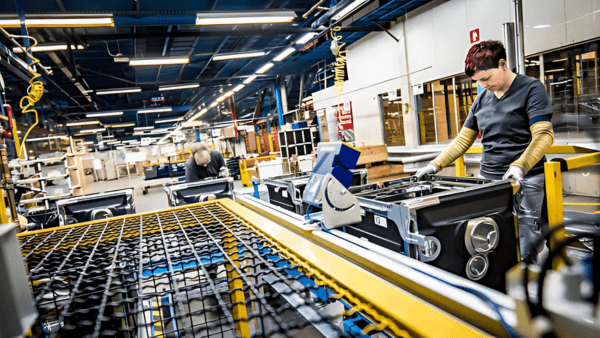7 Ways to Help Overcome the Talent Shortage
in the Manufacturing Industry

The manufacturing industry plays a crucial role in the U.S. economy, but it is facing a significant challenge: a talent shortage. Rapid technological advancements, changing skill requirements, and a lack of interest among younger generations have contributed to this issue. To ensure the continued success of the manufacturing sector, human resources (HR) professionals must proactively address the talent shortage problem. In this blog post, we will explore seven effective strategies that HR can employ to overcome this challenge and attract and retain skilled talent.
1. Strengthening Industry-Education Partnerships:
One way to bridge the talent gap is by forging strong partnerships between the manufacturing industry and educational institutions. HR departments should actively collaborate with schools, colleges, and vocational training centers to develop relevant curricula, apprenticeship programs, and internships. By aligning educational offerings with industry demands, HR can attract a steady stream of qualified individuals who possess the necessary skills and knowledge.
2. Emphasizing Workforce Development and Training:
Investing in the development and training of existing employees is crucial for addressing the talent shortage. HR should create comprehensive training programs that focus on both technical skills and soft skills required in the manufacturing industry. By upskilling and reskilling current employees, companies can retain valuable talent and adapt to changing job requirements, reducing the reliance on external hiring. The Talent Ladder offers training programs that attract, develop, and retrains workforces and offers college credits in the process.
3. Promoting Manufacturing as an Attractive Career Path:
HR professionals need to work on changing the perception of the manufacturing industry among job seekers. By highlighting the industry’s modern and innovative aspects, along with its potential for career growth and financial stability, HR can attract a broader pool of candidates. Engaging with communities, participating in job fairs, and leveraging social media platforms are effective ways to showcase the benefits of a career in manufacturing.
4. Implementing Flexible Work Arrangements:
The manufacturing industry has traditionally relied on rigid work schedules, which may deter some potential candidates, such as working parents or individuals seeking a better work-life balance. HR should explore flexible work arrangements, such as part-time work, remote work options, and flexible scheduling. These initiatives can widen the talent pool by accommodating diverse needs and attracting individuals who may have previously been deterred by the industry’s inflexibility.
5. Leveraging Technology and Automation:
The adoption of advanced technologies and automation in manufacturing has transformed the nature of work. HR professionals should embrace this change by integrating technology into HR processes, including recruitment, onboarding, and training. Automation can streamline administrative tasks, allowing HR teams to focus more on strategic initiatives like talent acquisition and retention. Demonstrating the industry’s commitment to embracing technology can make it more appealing to tech-savvy job seekers.
6. Developing Competitive Compensation and Benefits Packages:
To attract and retain skilled talent, manufacturing companies must offer competitive compensation and benefits packages. HR professionals should conduct regular market research to ensure that their salary and benefit offerings are in line with industry standards. Additionally, they should consider innovative incentives, such as performance bonuses, professional development opportunities, and health and wellness programs, to create a supportive and attractive work environment.
7. Fostering Diversity and Inclusion:
Diversity and inclusion are critical for the long-term success of any industry. HR departments should actively promote diversity by implementing inclusive hiring practices and creating a welcoming and supportive workplace culture. By embracing diverse perspectives, backgrounds, and experiences, companies can tap into a wider talent pool and foster innovation and creativity.
Overcoming the talent shortage in the manufacturing industry requires proactive and strategic efforts from HR professionals. By strengthening partnerships with educational institutions, emphasizing workforce development, promoting manufacturing as an attractive career path, implementing flexible work arrangements, leveraging technology, offering competitive compensation and benefits, and fostering diversity and inclusion, HR can successfully attract and retain the skilled talent needed to drive the industry forward. Through these seven strategies, HR can play a vital role in addressing the talent shortage and ensuring a thriving manufacturing sector.
Want to keep up with the latest employment insights and trends? Connect with First Call for relevant news in the light industrial and distribution space. Follow us on LinkedIn
Contact Us for a Customized Staffing Plan>
